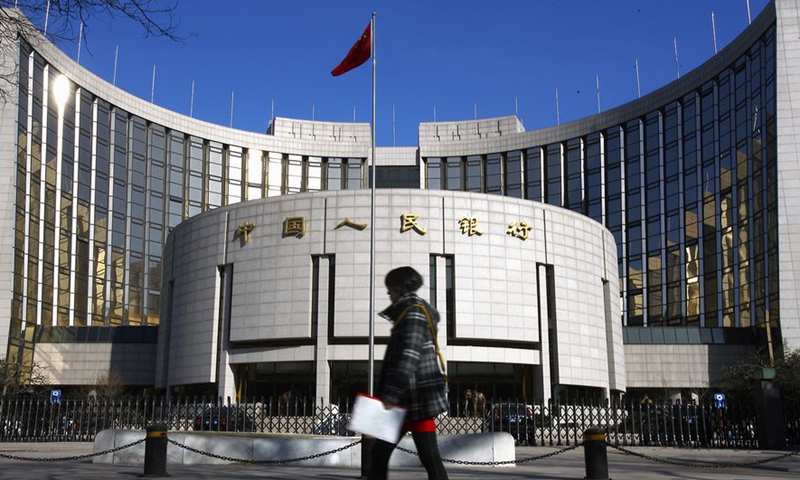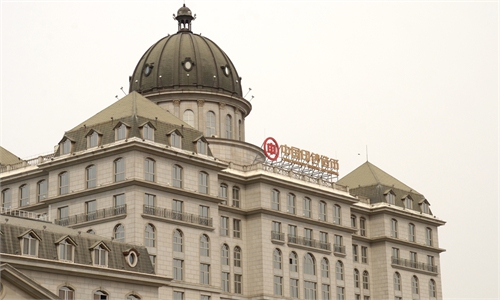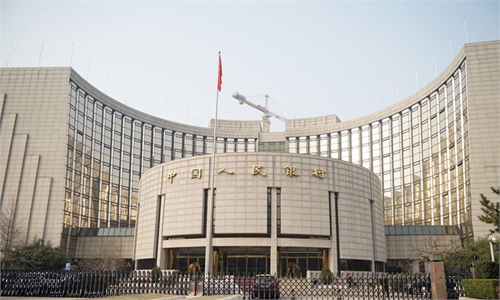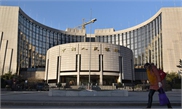
A file photo shows a pedestrian walks past the headquarters building of the People's Bank of China in Beijing, capital of China. (Xinhua)
A Tuesday press conference held in Beijing, where participating central bank officials had made an earnest pledge to ensure favorable financing, has turned out to be a much-talked-about morale booster for the Chinese economy amid multiple downward pressures.
Inspired by emotionally appealing remarks - a rarity in the central bank case - economists consider that the central bank has issued a clarion call to wide-ranging market participants to shift away from weakening expectations, one of the three major challenges confronting the economy in 2022.
Other than the monetary and fiscal easing already under way, greater efforts are being urged to funnel optimism into notably small export-oriented businesses, market watchers said Wednesday, seconding the central bank's visualization that the big downward pressures on the economy could become a "story of yesterday" in a few months.
Policy support in earnest
The annual press conference on financial statistics has reverberated beyond financial nerds, with remarks by Liu Guoqiang, a deputy governor of the People's Bank of China (PBC), the country's central bank, stirring heated discussions.
The country will open its monetary policy toolbox wider, maintain the stability of total credit and avoid the collapse of credit, Liu said, adding that the central bank's policy efforts will include targeted, forward-looking and preemptive policy moves to "walk ahead of the market curve and respond in a timely manner to general concerns of the market."
It cannot be delayed anymore, otherwise the market would be frustrated, Liu told reporters, stressing that "there is nothing worse than apathy," if the market is no longer concerned about it.
Calling for a timely response to market concerns, the PBC deputy governor said he believes the big downward pressures on the economy could become the "story of yesterday" in a few months.
A wider monetary policy toolbox suggests the cut of reserve requirements and interest rates and targeted credit support, as easing inflation paves the way for credit to be more readily available amid an economic downturn, Wei Fengchun, chief economist with Shenzhen-based Truvalue Asset Management, told the Global Times on Wednesday.
The latest easing move that came slightly earlier and stronger than expected indicates the central bank's efforts to avoid "integrated errors in the case of a prevailing tendency toward not taking actions, thus inevitably resulting in credit contraction," Wei said.
The erroneous scenario runs contrary to an expected expansion in credit, he went on to say, counting on the central bank's remarks and actions to send a clear signal that the PBC and other government departments all have pro-growth action plans, albeit at different paces, injecting a sense of much-needed optimism into the market.
Also on Tuesday, the National Development and Reform Commission (NDRC) said that it will moderately front-load infrastructure investment and steadily push for the 102 mega projects earmarked for the 14th Five-Year Plan (2021-25) to make concrete progress.
"The central government and the PBC have almost reached the pain threshold," Nomura economists wrote in a research note sent to the Global Times on Wednesday.
"As we argued in August 2021, Beijing's pain threshold is much higher than in previous tightening cycles as policymakers seem to be more willing to exchange some short-term pains for long-term benefits. Still, we believe there is a pain threshold, even if it is difficult to quantify," they said, betting on concerns expressed at the Tuesday conference to be an indication that the threshold is being approached.
A strong signal, as such, is expected to effectively address weakening expectations, one of the triple pressures on the Chinese economy this year - according to the Central Economic Work Conference held in December - that also include demand contraction and supply shocks, according to Wei.
The PBC on Monday lowered the rate on the seven-day reserve repurchase agreements by 10 basis points (bps) to 2.1 percent and cut the interest rate on the one-year medium-term lending facility (MLF) to 2.85 percent from 2.95 percent. The reduction in the two key policy interest rates was the first in roughly two years.
Moreover, according to Liu, commercial banks will submit optimal quotations for the loan prime rate (LPR) on Thursday.
The LPR, the de facto benchmark lending rate, is updated on the 20th of each month, which falls on Thursday this time.
The market has widely predicted a cut in the one-year LPR, which was already trimmed by 5 bps in December.
On top of that, per the Nomura economist' forecast, there would be one more 10 bps rate cut, a 50 bps reduction in reserve requirement ratio (RRR) over the next few months. The PBC, for its part, is expected to inject liquidity into the market through various facilities including MLF, re-lending and the special facility for cutting carbon emissions.
That the country has refrained from flood irrigation-style stimulus since the advent of the COVID-19 epidemic, unlike the quantitative easing-addicted West, is considered to have made China the only major economy to deviate from a US-led cycle of monetary tightening.
China's macro leverage ratio stood at 272.5 percent at the end of 2021, down 7.7 percentage points from the end of 2020, PBC's Liu revealed Tuesday.
Greater efforts needed
The conversion of current pressures into a transient cold spell still requires more pro-growth measures beyond merely monetary easing, observers said.
Whether monetary easing could be translated into risk-taking borrowing on the part of state and private sectors as well as households would be contingent upon supportive policies from other departments including the Ministry of Finance and the NDRC, Wei said.
China's monetary easing, as opposed to an estimated rate hike cycle in the US, would lead to fluctuations in the yuan's exchange rate, factoring in an open Chinese economy that allows comparatively free flows of capital, Wei said, adding that the currency swing depends on the extent of China's monetary easing versus US rate hikes and, more importantly, on China's economic survival.
"We are racing against the US. If we can swiftly prop up the economy, it's likely that the US may reconsider its rate hike decisions. It can't be ruled out that the US likes to bet on rate hikes to disturb China's economic rebound."
That China's central bank and the Fed go in different directions in rate change terms means the yuan tends to trend weaker, probably to 6.7-6.8 from the current range of 6.3-6.4, Tan Yaling, a Beijing-based independent economist known for her insight into foreign exchange, told the Global Times on Wednesday.
It is still hard to predict an exact timeframe for the weakening, said Tan. She noted, however, the estimated weakness is not sufficient to defuse woes especially among smaller exporters that have seen their earnings hit by the yuan's strength over the past year.
Concerns among the export-oriented private sector epitomize the lack of confidence about the economic prospects, necessitating more targeted pro-growth policies to genuinely funnel an expansion in credit into businesses in desperate need of funding, Tan remarked.
She cited a possible less hawkish regulatory tone on financial institutions' risk management so as to encourage debt extension into smaller private businesses.
Of note is that Wei warned against policy easing jointly pursued by the PBC and other government departments that might end up excessively ambitious which would renew the woes of overcapacity.
In a best-case scenario, the increase in leverage would supposedly feed through state firms, private firms and average folks in an orderly manner, Wei remarked, hoping for an improved COVID-19 situation to reduce the fallout of virus curbs on the economy.
If that is the case, economic activity could pick up, largely buoyed by the market's inherent momentum, he noted.





